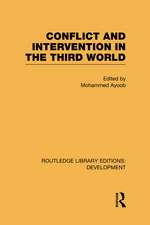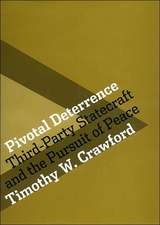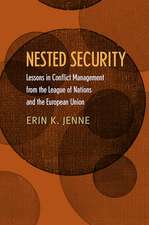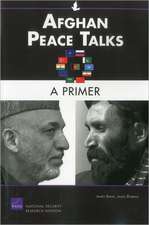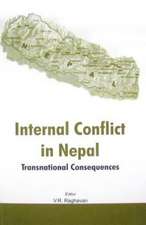Modern Hatreds – The Symbolic Politics of Ethnic War: Cornell Studies in Security Affairs
Autor Stuart J. Kaufmanen Limba Engleză Paperback – 30 mai 2001
Ethnic conflict has been the driving force of wars all over the world, yet it remains an enigma. What is it about ethnicity that breaks countries apart and drives people to acts of savage violence against their lifelong neighbors?
Stuart Kaufman rejects the notion of permanent "ancient hatreds" as the answer. Dissatisfied as well with a purely rationalist explanation, he finds the roots of ethnic violence in myths and symbols, the stories ethnic groups tell about who they are. Ethnic wars, Kaufman argues, result from the politics of these myths and symbols--appeals to flags and faded glories that aim to stir emotions rather than to address interests. Popular hostility based on these myths impels groups to follow extremist leaders invoking such emotion-laden ethnic symbols. If ethnic domination becomes their goal, ethnic war is the likely result.
Kaufman examines contemporary ethnic wars in the Caucasus and southeastern Europe. Drawing on information from a variety of sources, including visits to the regions and dozens of personal interviews, he demonstrates that diplomacy and economic incentives are not enough to prevent or end ethnic wars. The key to real conflict resolution is peacebuilding--the often-overlooked effort by nongovernmental organizations to change hostile attitudes at both the elite and the grassroots levels.
| Toate formatele și edițiile | Preț | Express |
|---|---|---|
| Paperback (1) | 274.66 lei 6-8 săpt. | |
| MB – Cornell University Press – 30 mai 2001 | 274.66 lei 6-8 săpt. | |
| Hardback (1) | 722.76 lei 6-8 săpt. | |
| MB – Cornell University Press – 30 mai 2001 | 722.76 lei 6-8 săpt. |
Din seria Cornell Studies in Security Affairs
-
 Preț: 254.66 lei
Preț: 254.66 lei -
 Preț: 287.02 lei
Preț: 287.02 lei -
 Preț: 115.88 lei
Preț: 115.88 lei -
 Preț: 155.47 lei
Preț: 155.47 lei -
 Preț: 248.19 lei
Preț: 248.19 lei -
 Preț: 163.94 lei
Preț: 163.94 lei -
 Preț: 141.33 lei
Preț: 141.33 lei -
 Preț: 116.92 lei
Preț: 116.92 lei -
 Preț: 147.82 lei
Preț: 147.82 lei -
 Preț: 140.64 lei
Preț: 140.64 lei -
 Preț: 145.90 lei
Preț: 145.90 lei -
 Preț: 154.39 lei
Preț: 154.39 lei -
 Preț: 147.84 lei
Preț: 147.84 lei -
 Preț: 231.77 lei
Preț: 231.77 lei -
 Preț: 136.31 lei
Preț: 136.31 lei -
 Preț: 121.64 lei
Preț: 121.64 lei -
 Preț: 215.07 lei
Preț: 215.07 lei -
 Preț: 341.43 lei
Preț: 341.43 lei -
 Preț: 166.80 lei
Preț: 166.80 lei -
 Preț: 143.72 lei
Preț: 143.72 lei -
 Preț: 181.67 lei
Preț: 181.67 lei -
 Preț: 326.47 lei
Preț: 326.47 lei -
 Preț: 133.63 lei
Preț: 133.63 lei -
 Preț: 231.77 lei
Preț: 231.77 lei -
 Preț: 159.62 lei
Preț: 159.62 lei -
 Preț: 146.59 lei
Preț: 146.59 lei -
 Preț: 164.13 lei
Preț: 164.13 lei -
 Preț: 339.49 lei
Preț: 339.49 lei -
 Preț: 258.54 lei
Preț: 258.54 lei -
 Preț: 309.71 lei
Preț: 309.71 lei -
 Preț: 233.12 lei
Preț: 233.12 lei -
 Preț: 155.27 lei
Preț: 155.27 lei -
 Preț: 283.96 lei
Preț: 283.96 lei -
 Preț: 155.59 lei
Preț: 155.59 lei -
 Preț: 232.20 lei
Preț: 232.20 lei -
 Preț: 153.84 lei
Preț: 153.84 lei
Preț: 274.66 lei
Nou
52.57€ • 57.12$ • 44.19£
Carte tipărită la comandă
Livrare economică 21 aprilie-05 mai
Specificații
ISBN-10: 0801487366
Pagini: 280
Dimensiuni: 157 x 234 x 20 mm
Greutate: 0.4 kg
Editura: MB – Cornell University Press
Seria Cornell Studies in Security Affairs
Locul publicării:United States
Descriere
Ethnic conflict has been the driving force of wars all over the world, yet it remains an enigma. What is it about ethnicity that breaks countries apart and drives people to acts of savage violence against their lifelong neighbors?
Stuart Kaufman rejects the notion of permanent "ancient hatreds" as the answer. Dissatisfied as well with a purely rationalist explanation, he finds the roots of ethnic violence in myths and symbols, the stories ethnic groups tell about who they are. Ethnic wars, Kaufman argues, result from the politics of these myths and symbols--appeals to flags and faded glories that aim to stir emotions rather than to address interests. Popular hostility based on these myths impels groups to follow extremist leaders invoking such emotion-laden ethnic symbols. If ethnic domination becomes their goal, ethnic war is the likely result.
Kaufman examines contemporary ethnic wars in the Caucasus and southeastern Europe. Drawing on information from a variety of sources, including visits to the regions and dozens of personal interviews, he demonstrates that diplomacy and economic incentives are not enough to prevent or end ethnic wars. The key to real conflict resolution is peacebuilding--the often-overlooked effort by nongovernmental organizations to change hostile attitudes at both the elite and the grassroots levels.



